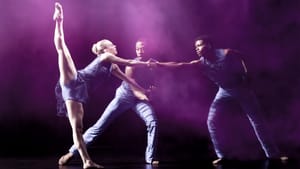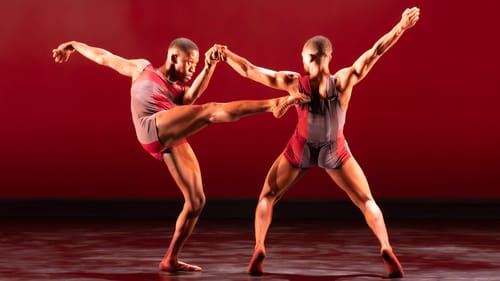Stay in the Loop
BSR publishes on a weekly schedule, with an email newsletter every Wednesday and Thursday morning. There’s no paywall, and subscribing is always free.
Two world-premiere dances meet earlier works that resonate today
PHILADANCO! presents Relentless Resident Visions

Artistic director Kim Y. Bears-Bailey promised the audience sunshine on a rainy spring day, and Philadelphia Dance Company (PHILADANCO!) delivered. The landmark company’s 55th anniversary concert series paired two world premieres with two works from the early aughts. Relentless Resident Visions (performed April 25-27, 2025, at the Kimmel’s Perelman Theater) featured Black choreographers and reflected the breadth of PHILADANCO!’s repertory, along with its contributions to the arts in Philly and beyond. Memorable images and energetic dancing cut through the day’s gloom in an inspiring affirmation of life and artistic expression.
Echoes of Ailey
Echoes: A Celebration of Alvin Ailey (2000) by Milton Myers speaks to the choreographer’s love and joy of working with the pioneering artist and activist. This came through in the work’s reverent energy, quick tempo, and athletic movement. Drawing from styles including ballet, jazz, modern, and Black vernacular dance, Echoes featured shifting combinations and formations of dancers. A sensual duet featured technically complex balances and lifts before a solo with showstopping leaps. In colorful costumes by Natasha Guruleva, the dancers resembled a kinetic rainbow.
A singular choreographic approach
Promise Me You Won’t Call, a gorgeous and haunting new work by Tommie-Waheed Evans, shifts the mood to loss and grief in a way that feels familiar and necessary. Evans created the work in collaboration with dancers Ankhtra Battle, Andrew Bryant, William E. Burden, Addison Hill, Israel Hilton, Raven Joseph, Floyd McLean Jr., Nathan McNatt Jr., Brittany Wright, and Aliyah Clay. The title suggests going no-contact after a relationship collapse, while program notes call the dance “a release” or “soft letting go” that moves “between ache and acceptance.” Oblique as they are, these words accurately describe Promise Me You Won’t Call, which contemplates difficult experiences nearly everyone can relate to.
The work finds beauty and holiness in suffering with breathtaking and au courant effectiveness. Evans, a former dancer with PHILADANCO!, creates work that deconstructs music, meaning, and dance itself. Promise Me You Won’t Call is a sensually arresting work that plays with sight, sound, and movement. Lighting by Nick Kolin and sound by Uwazi Zamani helped Evans and the dancers create an environment as disorienting as a breakup. Songs by Patti LaBelle were exploded into their components, with snippets of vocals and music layered over a mechanical drone. Dancers seem to emerge from darkness, mist, or LaBelle’s echoing words. They paired into duos whose movement included gestures of struggle like dragging and kicking before the piece culminated in ritual and desertion. Evans’s choreographic approach put him on my radar in 2022, and I have seen nothing like it. Promise Me You Won’t Call might have been better suited to the end of the program, since the works that followed suffered in comparison.
The Dance You Dance and Enemy Behind the Gates
Relentless Resident Visions seemed to consider the present with dances by Ray Mercer and Christopher Huggins. The Dance You Dance, a world premiere by Mercer, was inspired by the choreographer’s long relationship with PHILADANCO! Meanwhile, Huggins’s Enemy Behind the Gates (2002) reflects the ideological, political, and military conflicts of its era, which resonate with our present ones. Though well done, they were less exciting than Evans’s experimentation and forward thinking.

A prop and rhythmic original music by Bongi Duma added novelty to The Dance You Dance. Dancers leapt over, moved across, and sat upon a bench. Athletic movement incorporated lifts, solos, and ensemble work before a dramatic finish. The work claims to celebrate the choreographer’s relationship with the dance company, but its aggressive and fearful gestures, like kicking feet and hands at throat, raised questions about that relationship.
Enemy Behind the Gates conveyed conflict more directly. Black military-style jackets (designed by and created by Guruleva) reflected the work’s themes of struggle, strength, and masculinized stoicism. Balances and lifts suggested power, control, and negotiation. The dancers rose to the demands of this work’s fast pace, technical complexity, and physical demands.
The relentless vision we need
PHILADANCO! is a strong company with an important legacy, though the dancing was not as crisp as usual at the performance I attended. Timing was off during synchronized sections throughout the show, with one or two dancers anticipating or lagging behind the others. Though less attentive viewers may not have noticed, it resulted in two works fumbling at the end. Nevertheless, the program offered exactly the kind of relentless vision we need right now. Relentless Resident Visions honors the past, considers the present, and glimpses a promising future in Promise Me You Won’t Call.
What, When, Where
Relentless Resident Visions. Choreography by Milton Myers, Tommie-Waheed Evans, Ray Mercer, and Christopher Huggins. PHILADANCO! $29-$49. April 25-27, 2025, at the Kimmel Cultural Campus’s Perelman Theater, 300 S Broad Street, Philadelphia. (215) 893-1999 or philadanco.org.
Accessibility
Ensemble Arts Philly venues, including the Perelman Theater, are wheelchair-accessible.
Sign up for our newsletter
All of the week's new articles, all in one place. Sign up for the free weekly BSR newsletters, and don't miss a conversation.

 Melissa Strong
Melissa Strong